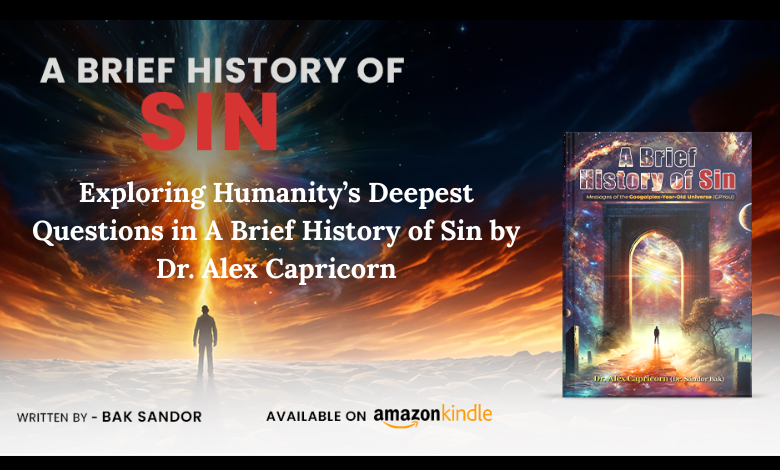In A Brief History of Sin: Messages of the Googolplex-Year-Old Universe, Dr. Alex Capricorn takes readers on a mind-bending journey through time, space, and the deepest existential questions that have plagued humanity for centuries. This groundbreaking work combines philosophy, quantum physics, and metaphysical inquiry to answer questions about existence, sin, and the very nature of reality itself. Dr. Capricorn embarks on an intellectual odyssey that dares to ask the big questions: What if our universe is just one of many, a mere speck in the infinite multiverse? What if our sins, our choices, and even our thoughts have the power to shape the very fabric of reality? Can we, as individuals, influence the course of the universe with our actions? These profound questions are not merely theoretical musings but are explored in the context of the revolutionary Metaplex Theory introduced in the book—an entirely new framework that challenges our conventional understanding of space, consciousness, and the infinite cosmos.
A Fusion of Scientific Theory and Philosophical Depth
Dr. Capricorn’s work is more than just an academic exercise—it is an invitation to embark on a journey that blends cutting-edge scientific theory with deep philosophical insight. By integrating quantum physics and cosmic history, Capricorn pushes the boundaries of how we understand not only our universe but also the moral dimensions that define our existence. The book challenges readers to think critically about the nature of sin and its implications on our universe, asking whether our actions—both individual and collective—contribute to a larger cosmic design. It explores the possibility of a “Constitution of the Multiverse,” a metaphysical governing force that could oversee not just earthly laws but the very principles that govern reality itself. The questions raised in A Brief History of Sin are as vast as they are essential, and readers are left questioning whether morality, choice, and existence itself could be interconnected in ways we’ve never before imagined.
In a world where modern science often operates on a strict separation from spirituality, A Brief History of Sin bridges that gap by asking readers to consider the impact of their moral choices within the context of a much larger, multidimensional reality. The blending of hard scientific theories, such as quantum mechanics, with metaphysical musings about the moral compass of the universe is not just fascinating—it’s necessary. In exploring the intersection of scientific knowledge with existential thought, Dr. Capricorn offers a radically new perspective on the multiverse, one where the nature of sin, morality, and the actions of individuals play a pivotal role in shaping cosmic structures.
The Metaplex Theory: A Revolutionary Framework
The heart of A Brief History of Sin lies in Dr. Capricorn’s Metaplex Theory, a bold new framework that redefines our understanding of consciousness and the infinite expanse of the multiverse. The Metaplex Theory introduces a radical approach to understanding the universe as a network of interconnected realities, where each action, thought, and decision has the potential to affect not just the individual but the fabric of the multiverse itself. This theory challenges the traditional model of a singular, deterministic universe and instead suggests a dynamic, interactive cosmos where realities coexist, overlap, and influence each other.
The Metaplex Theory explores the possibility that the universe is not a static entity but a living, breathing network of dimensions where morality and existence are fluid and ever-changing. It suggests that the concept of sin, often relegated to human actions within a singular reality, could have far-reaching implications that affect the very structure of the multiverse. This groundbreaking theory offers readers a new contact through which to understand both the physical world and the metaphysical concepts that shape our perceptions of good, evil, and everything in between.
Exploring the Cosmic Questions
The Book of Questions dares to ask what might seem like impossible questions. What if the very nature of sin is tied to the fabric of the universe, where every act of kindness, every sin, every decision reverberates across time and space? Dr. Capricorn’s exploration of the Metaplex Theory offers a fascinating and deeply philosophical perspective on the multiverse. The concept of a “Constitution of the Multiverse” presents a powerful analogy for how universal principles might not only govern nations and societies but also the very structures that hold reality together. This theoretical framework challenges readers to think beyond traditional science and philosophy, offering an entirely new lens through which to view our place in the cosmos.
In addition to the metaphysical questions raised, Dr. Capricorn also explores the more practical implications of the Metaplex Theory for human existence. He raises the question: How do our choices—our moral decisions—affect the multiverse and the structures that govern it? Can we, as individuals, influence the course of the cosmos through our actions? In A Brief History of Sin, readers are prompted to reflect on their own role in shaping not just their reality, but the universe itself.
Conclusion
The Book of Questions is not just an academic exploration—it’s a compelling invitation to confront the mysteries of the universe and our place within it. Dr. Capricorn’s profound insights and bold questions will leave you contemplating the deepest aspects of existence, pushing you to reflect on the consequences of your actions and the moral framework that guides your life. As you read A Brief History of Sin, you are encouraged to think critically about your relationship with the universe, with the multiverse, and with the moral structures that govern both.
In the end, A Brief History of Sin is more than just a book—it’s a philosophical odyssey that invites you to challenge your deepest assumptions about existence, the multiverse, and the moral implications of our actions. Dr. Capricorn’s profound insights and bold questions will leave you contemplating the mysteries of the universe long after you’ve turned the last page. This work challenges everything you thought you knew about consciousness, space, and human purpose.





Leave a Reply